The General Conference of UNESCO rejected Kosovo’s bid to become its newest member last Monday (Nov. 9). With a two-thirds majority required, Kosovo was only three votes awayfrom entering what is known as the intellectual agency of the United Nations, securing 92 of the votes cast to 50 against (with 29 abstentions).
Kosovo’s Ministry of Foreign Affairs led the #kosovoinUNESCO campaign, in an effort to join the entity that combines international efforts and resources to protect and promote the world’s wonders, science, culture, and education. During the 10-month diplomatic campaign, Kosovo faced a very strong counter-lobby by its neighbor, Serbia, despite normalization talks and agreements over the past few years between the two countries that were once at war.
Following Kosovo’s failed UNESCO bid last week, 54 organizations and nine individuals from civil society signed an open letter with four clear demands: that the government set out clear future conditions for Serbia to adhere to in order for the dialogue to continue; that the European Union should ensure equal treatment for Kosovo in its path toward integration; that there should be institutional accountability within Kosovo for the failed bid; and that international standards with regard to cultural heritage should still be implemented despite the UNESCO rejection.
Kosovo 2.0 takes a look at the four demands, one by one:
1. The necessary conditions for continuing the dialogue with Serbia should be established
Serbia’s lobbying campaign for Kosovo not to be admitted into UNESCO was extremely aggressive. At one point, the country’s Minister of Foreign Affairs, Ivica Dacic, went as far as to say that Kosovo’s UNESCO membership application “would be the same [as] if someone proposed ISIS for UNESCO membership. What is the difference?” This is only one example, but Serbian officials never hid their intentions of blocking Kosovo’s application.
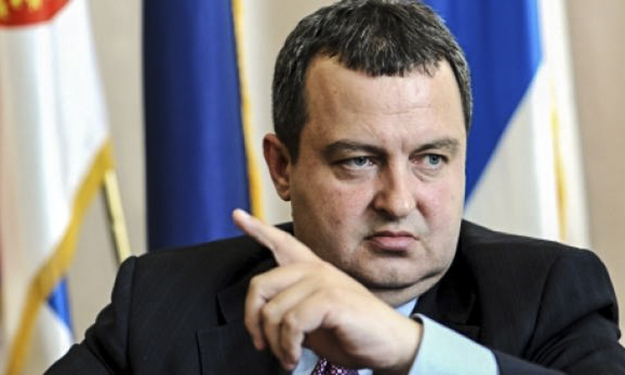
Serbia’s Minister of Foreign Affairs, Ivica Dacic, compared Kosovo’s UNESCO membership bid to an application by ISIS.
Kosovo and Serbia have been engaged in formal dialogue, mediated by the EU in Brussels, since March 2011. In light of Serbia’s blocking campaign, the open letter by members of Kosovar civil society requests the government of Kosovo to set conditions that need to be met by Serbia in order to have an ongoing dialogue. “In the actual circumstances, any continuation of the dialogue with Serbia is unacceptable for us,” says the declaration.
Asked about this situation, journalist Adriatik Kelmendi, who has signed the declaration, told Kosovo 2.0 that the behavior of Serbia in the UNESCO vote shows that it is not eager to normalize relations with Kosovo. “It still tries to undermine Kosovo’s statehood, and to prevent Kosovo’s society from having a normal life,” he said. The journalist believes that the government should now consider “postponing the implementation of the agreements [with Serbia] until we see that there is reciprocity in the implementation of these agreements.”
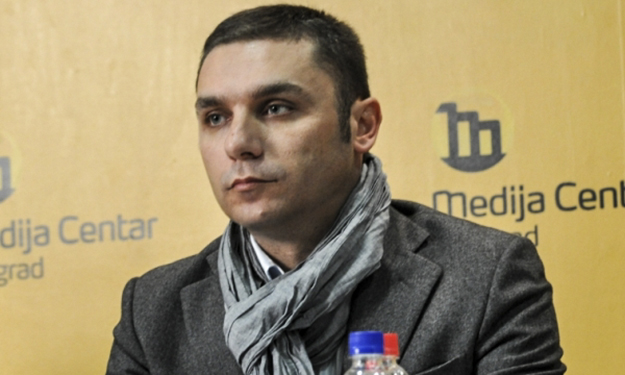
Journalist Adriatik Kelmendi, one of the signatories of the open letter by members of civil society, believes that the implementation of the recent agreement with Serbia should be suspended until Serbia shows greater cooperation.
An initial agreement of principles was reached in April 2013, while in August this year, Serbia and Kosovo reached an agreement to finalize arrangements on four key issues: energy, telecoms, the freedom of movement at the bridge across the River Iber in Mitrovica (which separates the majority Serb north of the city from the majority Albanian south), and the establishment of the Association of Serb Majority Municipalities. The Association would have its own assembly, president and flag, and would be allowed to receive funding from Belgrade.
It is the agreement to establish the Association that has been one of the major causes of the current Assembly standoff that has been ongoing for more than a month. Since September 22, the opposition, led by Vetevendosje, have used a variety of unusual tactics to block any discussion of this agreement. President Atifete Jahjaga sent the issue to the Constitutional Court for a ruling on its constitutionality, which on Tuesday suspended its implementation until January 12, 2016, when it will issue a full verdict.
Kelmendi says that the dialogue has become a blame game. “This is one issue that is consuming so much energy and efforts, and it’s preventing the country from focusing on very important topics such as economic development,” he said.
Agon Maliqi, political scientist, goes further, and gives some indication as to what strategy Kosovo’s government should follow. “Kosovo should use whatever leverage it has,” he told Kosovo 2.0. “Even if this means temporarily suspending efforts to reach new agreements, or perhaps more realistically by not proceeding with the implementation of previous agreements.”
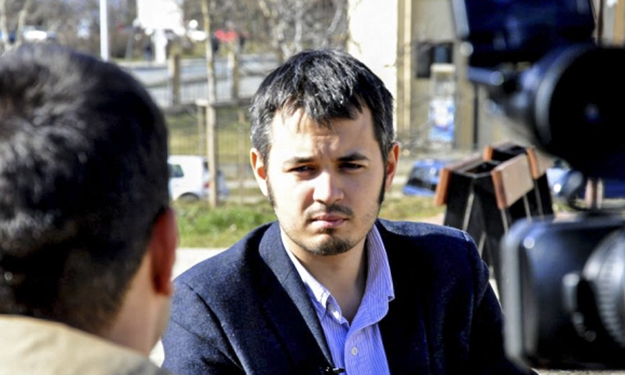
Political scientist, Agon Maliqi, also believes that Kosovo should consider suspending the implementation of the recent agreement with Serbia.
In his opinion, this is a moment in which Kosovo’s government should target Western countries and “frame Serbia as non-cooperative and destructive, [and] as a protector of Russian interests in the region.” Russia backed up the lobbying campaign against Kosovo in UNESCO, and is one of the two UN-Security Council members that keeps blocking Kosovo’s UN membership by exercising its power of veto. “Kosovo’s strategic goal should be to end this situation whereby Serbia has both the support and understanding of the West, and Russian patronage,” said Maliqi.
2. The European Union should ensure conditions for equal dialogue
The second demand in the civil society open letter is addressed to the EU Member States and the European Union, as the mediator of the normalization negotiations between Kosovo and Serbia.
The letter says that insistence for Kosovo to be at the dialogue table under the current circumstances, “even when Serbia is totally uncooperative,” would be an “unjust act,” and one that would be “unacceptable.”
The day after the UNESCO vote in Paris, the European Commission published its latest Progress Report for Kosovo. A much anticipated document, as it influences the European Union’s approach to its enlargement strategy. The report praised Kosovo’s advancement in signing key agreements: the one with Serbia to help normalize relations and the Stabilisation and Association Agreement with the EU.
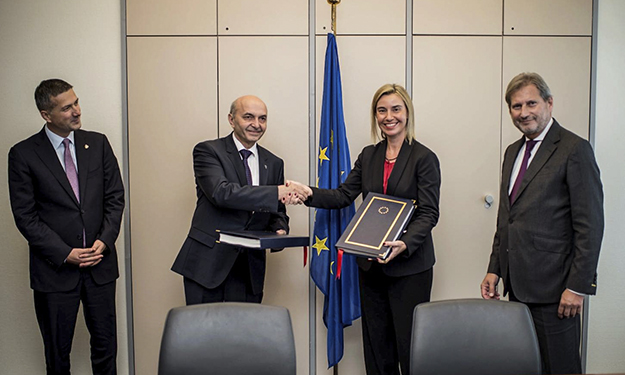
Kosovo recently signed a Stabilisation Association Agreement with the EU, becoming the last country in the region to do so.
As part of the 2013 agreement on principles governing the normalization of relations between both republics, Kosovo and Serbia agreed not to “block, or encourage others to block, the other side’s progress in their respective EU path.”
For political scientist Maliqi, this point should be reinforced in the agreement between the two countries and with their respective agreements with the European Union. “Some additional conditionality was lately introduced in the EU-Serbia negotiation process related toChapter 35 [covering dialogue with Kosovo] that prevents Serbia from proceeding with accession negotiations in other chapters if it fails to implement agreements from the Brussels negotiations,” said Maliqi. “The EU should expand this conditionality by including access to international organizations as an additional clear condition.”
For Maliqi, “the fate of Serbia’s EU accession depends on EU member states, so EU countries have significant leverage over Serbia’s policy and behavior.” He believes that the implications of Serbia’s campaign against Kosovo will be greater than just denying Kosovo UNESCO membership. “It is important to note that Serbia’s aggressive lobbying at UNESCO did [not] only represent a slap at Kosovo, but also a slap at the West,” he said. “This will not remain unnoticed. Especially the fact that Serbia asked for Russian patronage at a time of EU-Russia divide. Serbia will pay for this one way or another.”
3. There should be institutional responsibility for this failure
Many voices, and not only those signing the civil society declaration, have asked the government to take responsibility for the diplomatic failure. Opposition leader, Visar Ymeri and influential writers such as Halil Matoshi, have pointed the finger towards one person: Hashim Thaci. The deputy prime minister and minister of foreign affairs has gone practically off the radar after his diplomacy strategy failed by three votes in Paris.
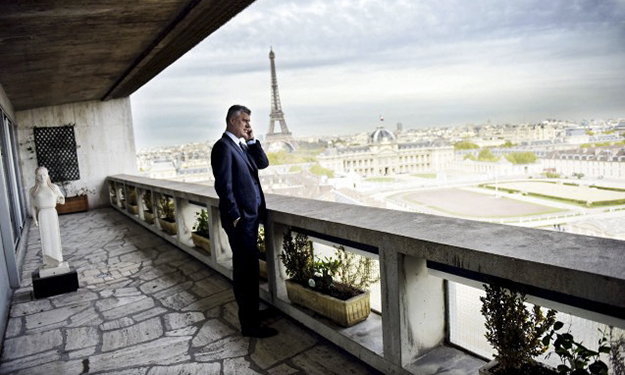
Minister of Foreign Affairs and Deputy Prime Minister, Hashim Thaci, has faced calls for his resignation following Kosovo’s failed UNESCO application.
In an article for Balkan Transitional Justice published on Thursday (Nov. 12) by Deputy Minister of Foreign Affairs, Petrit Selimi — who was very much on the diplomatic front line for the Kosovo lobbying efforts — Selimi shifts the blame towards Serbian efforts to block Kosovo’s UNESCO membership.
He also gives some insight into the “positive” #kosovoinUNESCO campaign, which he compared to the Serbian one that included many references to the 2004 riots in Kosovo, in which many Orthodox churches were damaged, burnt or destroyed, and as a result of which more than4,000 people from different minorities fled Kosovo.
Selimi explains that instead of resurrecting “images of mosques burned by the Serbian army in 1999” or talking about the “theft of monuments by the Serbian state,” the diplomacy team chose to present a positive campaign focusing on “the need of the youth of Kosovo to have equal access to programs of the global organization on education, culture and science.” Several books were published, a website was created, and social media users were asked to inundate their social media profiles with images that supported #kosovoinUNESCO.
After referring to several aspects of the campaign, Selimi suggests that the Ministry of Foreign Affairs had limited capacity. “With a staff and budget eight times smaller than Serbia’s — and less than half the size of the UNMIK mission in Kosovo — it was clear that Kosovo has limitations in the field of multilateral diplomacy, where trading of the votes and favors, personal connections and global alignments are as important as the strength of bilateral ties.”
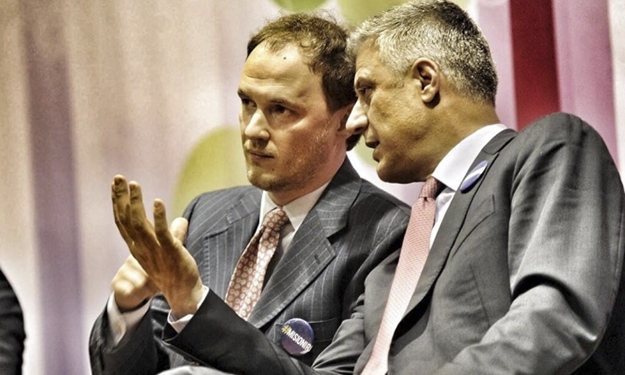
Petrit Selimi (left) was on the front line of Kosovo’s diplomatic efforts to join UNESCO, along with Hashim Thaci.
The deputy minister explains that the Kosovar diplomatic team met over 150 individual delegations between January and May of 2015 before committing to submitting the application in the summer. He goes on to say that Kosovo refused to seek the vote of “Syria’s Bashar Al-Assad or North Korea’s Kim Jong-un, people Serbia actively courted via interlocutors in the last weeks of the campaign.”
At least seven countries that recognize Kosovo chose to abstain during the vote last week; Egypt, Guinea Bissau, Japan, Nigeria, Poland, Central African Republic, and South Korea all decided not to back Kosovo’s bid.
For Kosovo Rapporteur and Vice President of the European Parliament, Ulrike Lunacek, the three votes deficit showed that Kosovo’s UNESCO bid strategy was not well prepared. “Kosovo has 24 embassies abroad, but six of them don’t have ambassadors,” she said at a press conference in Prishtina last week. “They work with [temporary workers]… Kosovo needs to make sure that it’s not missing three votes.”
Activist Hajrulla Ceku, director of the heritage NGO, EC Ma Ndryshe, which was one of the signatories of the civil society declaration, emphasized that there should be political accountability for the failure. “Thaci wanted all the credit for himself, and now grants responsibility of failure to all but himself,” he told Kosovo. “Thaci should go, as a direct consequence of the biggest diplomatic failure for Kosovo.”
To date, there have been no resignations, and it looks unlikely that there will be any.
4. Kosovo should fulfill international obligations on cultural heritage, despite its non-membership of UNESCO
In Kosovo most of the public discussion, both leading up to the UNESCO vote and in its aftermath, has been focused on the politics of Serbia’s lobbying campaign and what it claims as its patrimony — from churches to monasteries, including some already protected by UNESCO. However this has tended to overlook the fact that the membership bid has been fought in parallel to a system that is still weak on cultural heritage protection.
In the open letter, Kosovo’s government is urged to declare cultural heritage as a policy of national interest. The signatories urge the institutions to unilaterally adopt UNESCO conventions; to designate cultural heritage properties with permanent protection; to draft management plans for cultural heritage properties; to establish an internal dialogue for Orthodox heritage sites; to address illegal construction inside protected heritage areas; and to adopt a new law and national strategy for cultural heritage.
Kosovo’s cultural heritage is enriched by many different types of tangible and intangible attributes. It includes the filigran products made by silversmiths, many kullas or tower houses, mosques and churches, archaeological sites such as the ancient Roman city of Ulpiana, and sites such as the Prizren fortress. The Novo Brdo Castle is currently undergoing a restoration project that is being implemented by UNESCO itself.
There are also several sites declared UNESCO protected heritage in Kosovo, which were proposed by Serbia in 2006 and are currently part of the UNESCO List of World Heritage in Danger. The sites include the Monastery of Decan, the Monastery of Gracanica, the Patriarchy of the Monastery of Peja, and the Holy Virgin of Ljevisa Church. All are protected under the label of “Medieval Monuments in Kosovo,” and are administered by the Serbian Orthodox Church.
Though there are more than 1,500 properties under temporary protection in Kosovo, the country’s patrimony remains neglected. Only in August, a 19th century residential house and adjoining guesthouse in the Historical Center of Prizren, were demolished, raising questions as to whether Kosovar authorities are doing enough to protect national heritage. EC MA Ndryshe reported this demolition, which the organization considers illegal, arguing that due to their location these structures were protected by the Law of the Historic Center of Prizren.
It also argued that the properties were included on the Cultural Heritage List under temporary protection. This organization informed Kosovo 2.0 that, after much pressure, the public prosecutor has now initiated an investigation, and the director of the municipal Inspectorate has filed a criminal charge against the investor who bought and demolished the property.
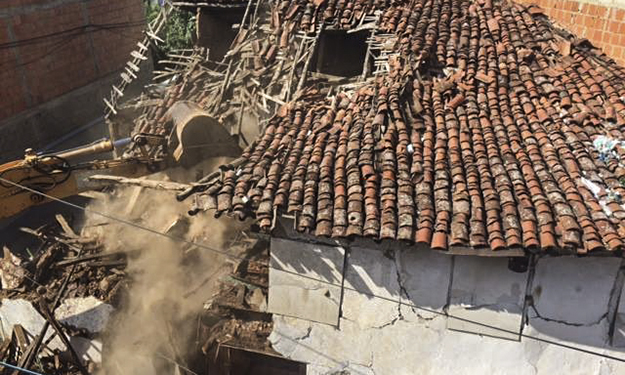
Questions have been raised about the government’s efforts to protect cultural heritage in Kosovo. In August, a 19th century residential house and adjoining guesthouse were demolished, despite being in the Historical Center of Prizren.
Nevertheless, Vjollca Aliu, head of the Cultural Heritage department in the Ministry of Culture, says that, compared to the post-war period, things have improved. In a debate about cultural policies held two weeks ago, before the vote took place, Aliu said that “if [Kosovo] becomes a member of UNESCO many things would need to change in regard to cultural heritage, and it’s not enough that the Ministry of Culture has cultural heritage as a priority — many other actors have to be involved.” Aliu told Kosovo 2.0 that until now, the priority has been legislation and developing the institutions.
However there is a key cultural heritage protection institution that has remained neglected for several years: the Kosovo Council for Cultural Heritage. This body is an independent agency created out of the Constitution and the Law on Cultural Heritage. Its mandate is to oversee and coordinate the implementation of the legal system and to support the protection, conservation and management of cultural heritage. The Council has the role of approving certain patrimony to be part of the National Cultural Heritage List under permanent protection in Kosovo, but until September 7, the board hadn’t been functional for more than three years.
Gjejlane Hoxha, director of the Council, told Kosovo 2.0 that she had written “kilometers of letters” to the Assembly of Kosovo — the organ responsible for nominating the Council’s seven members — in order to ask for this issue to be solved long before. The Assembly justified the delay on a legal ambiguity; meanwhile leaving Kosovo’s cultural heritage on a waiting list.
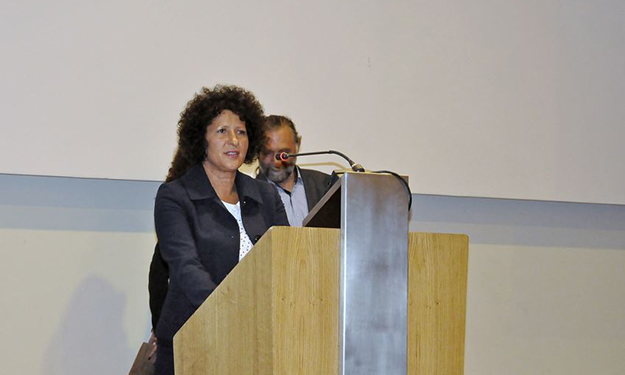
Gjejlane Hoxha says she sent “kilometers of letters” to the Assembly, urging them to appoint members to the board of the Kosovo Council for Cultural Heritage. The board finally became functional again on September 7 this year after more than three years of inactivity.
Prior to the UNESCO vote, Hoxha told Kosovo 2.0 that the Kosovo Council for Cultural Heritage still hadn’t received the proper documentation for the nominations of potential cultural heritage under permanent protection, a responsibility of the Ministry of Culture.
As a consequence of the stagnation and delay to this process, there haven’t been new properties added to the National Cultural Heritage List under permanent protection for more than three years. Therefore, more than 1,500 sites, monuments, and other properties considered cultural heritage by the Ministry of Culture, have remained neglected and in limbo on a temporary protection list. As a consequence, they await the management and conservation plans that would secure their adequate documentation, usage and actual permanent preservation.
Sali Shoshi, head of Cultural Heritage without Borders, a highly active non-profit organization in the field of restoration and heritage promotion, gives a simple example of this situation. “If you go to Ulpiana, the most well known cultural site in Kosovo, nobody is there,” he told Kosovo 2.0. “No guide, no reception for visitors, no facilities for visitors…”
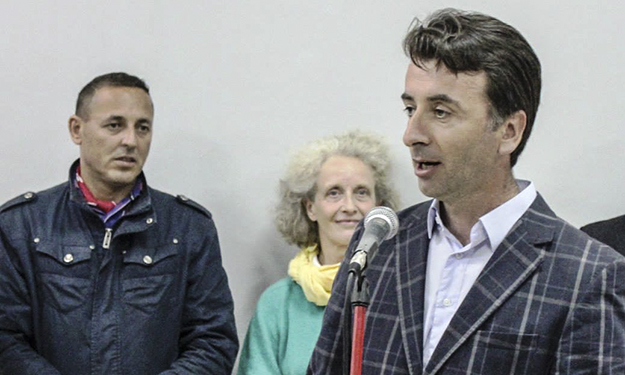
Sali Shoshi, head of Cultural Heritage without Borders has criticized the government’s lack of strategic policy making on cultural heritage protection.
Interviewed before the UNESCO vote took place, Shoshi suggested that UNESCO membership would be an opportunity to put pressure on the institutions into developing the required management plans. He is unimpressed by the management of cultural heritage by the central authorities to date. “They don’t have long term strategies and policies,” he said. “It is very much an ad-hoc approach.”
In this regard, a National Strategy for Cultural Heritage 2015-2025 has now been drafted, and it has been recently published on the Ministry of Culture’s website for public consultation. However these are currently just words expressing good intentions; there is still no action plan that establishes how the ideas in this draft will translate into practice.
The declaration signed by civil society actors states that UNESCO standards should be unilaterally adopted by Kosovo’s Assembly. Ceku, from EC Ma Ndryshe, told Kosovo 2.0 (in an interview held a month prior to the UNESCO vote), that the approval of UNESCO charters was the most frequent recommendation put forward in civil society policy documents. “Our institutions ignored civil society recommendations,” he said.
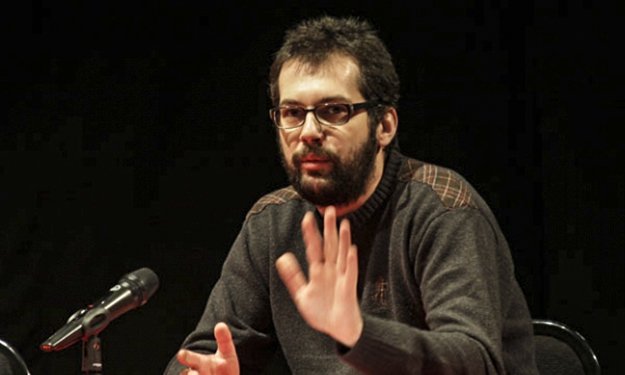
Hajrulla Ceku, director of EC Ma Ndryshe, and one of the signatories of the open letter by members of civil society, has urged Kosovo’s government to unilaterally introduce international cultural heritage protection standards, despite Kosovo’s UNESCO rejection.
Kosovo must come to terms with the fact that it has failed to enter UNESCO. It is now for the country’s government to decide how much commitment it truly has to the values that it has proclaimed over the past 10 month; with UNESCO or without it.K

